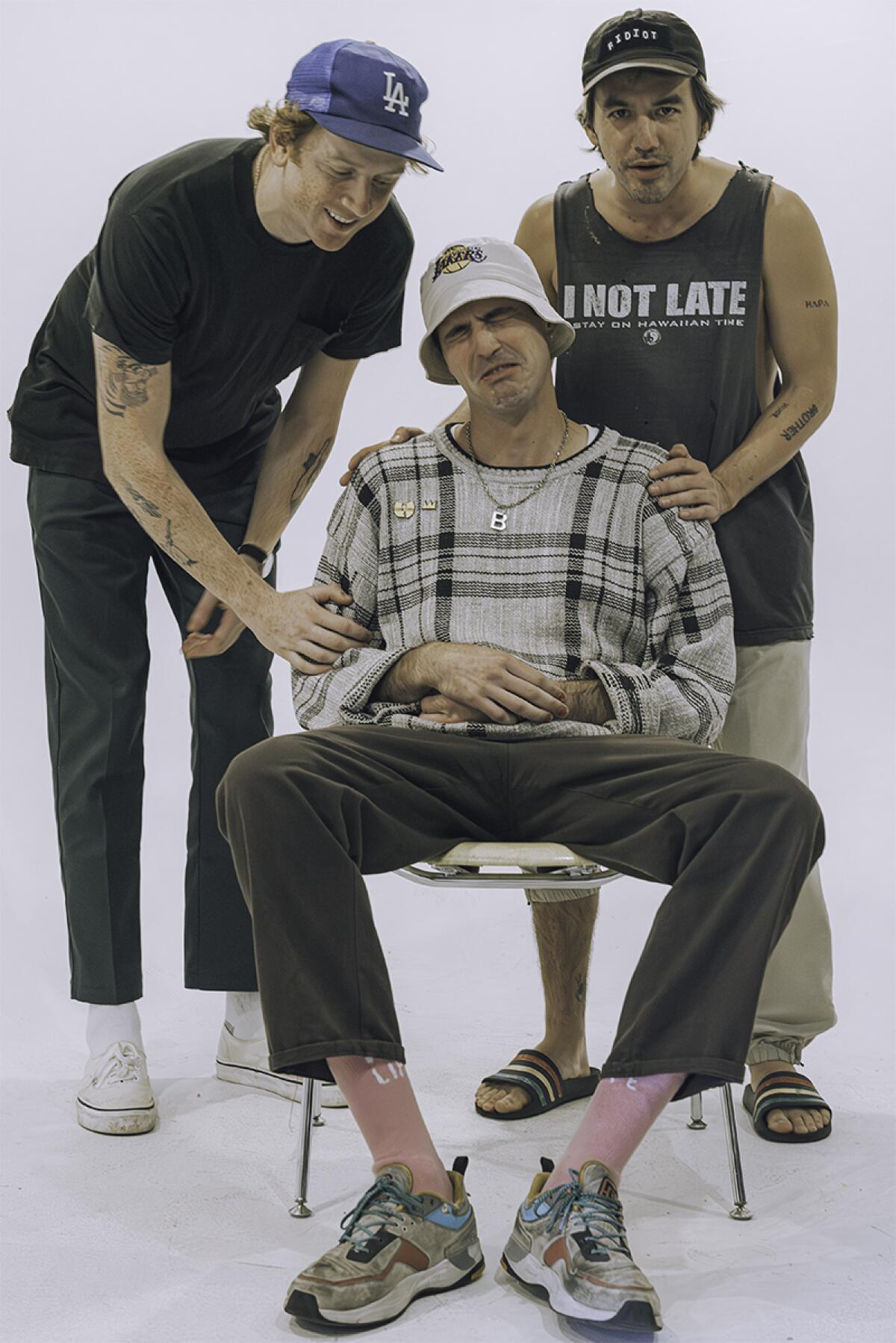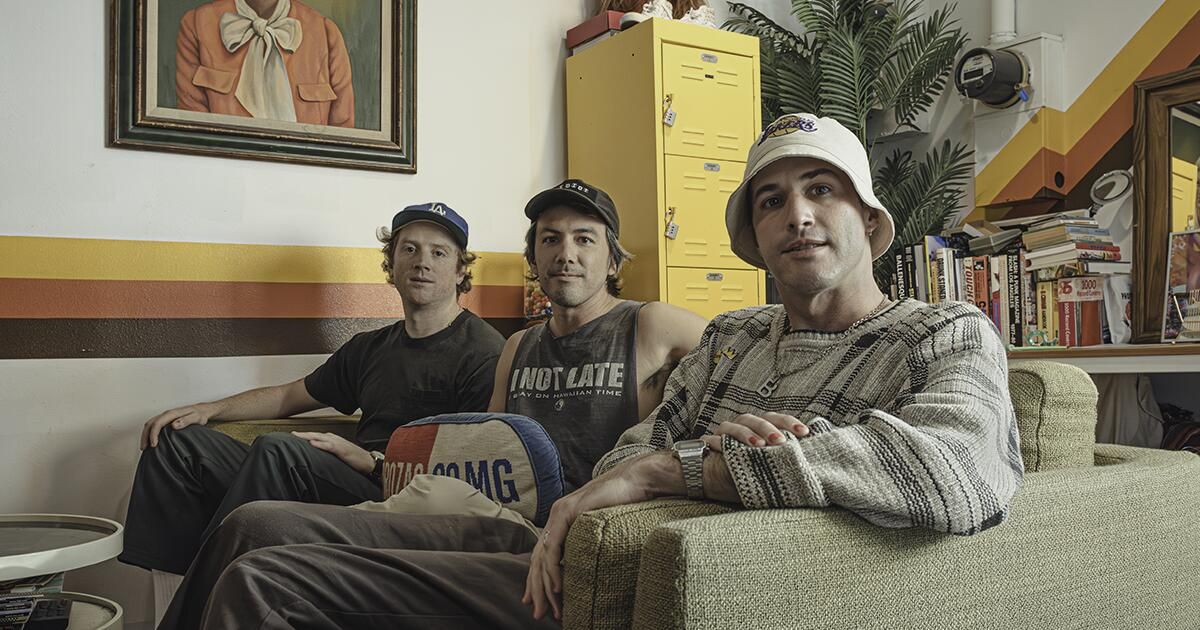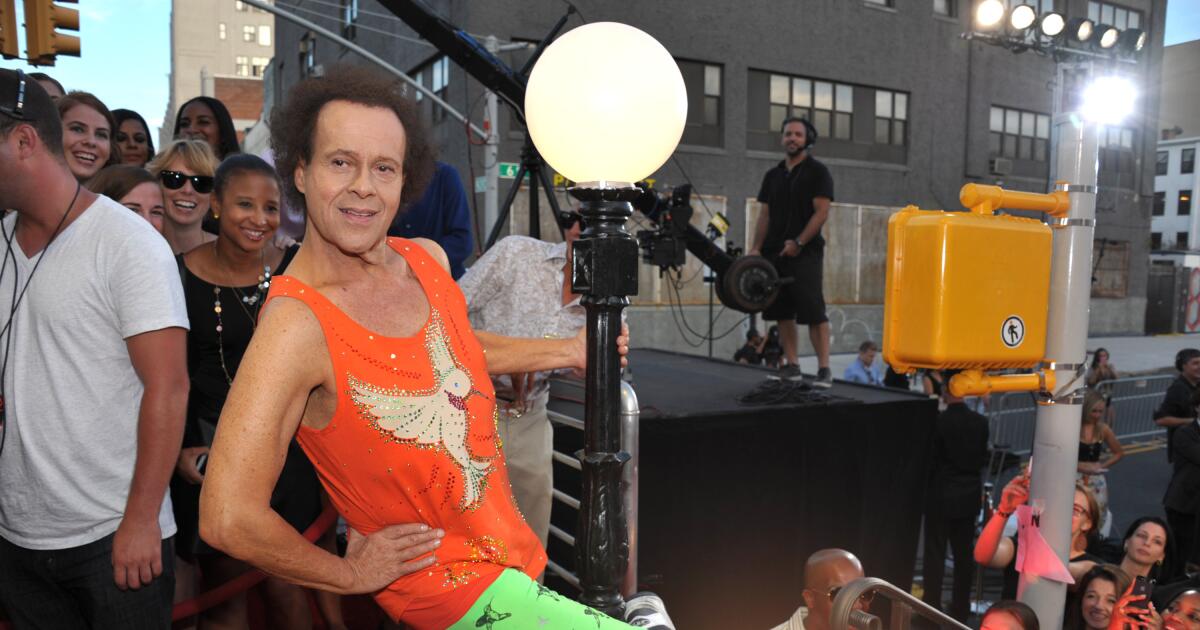When the three remaining members of the rock band FIDLAR decided to take a short break at the end of 2019, they didn't count on a global pandemic extending their hiatus to almost three years.
When the trio of guitarist/vocalist Zac Carper, bassist Brandon Schwartzel and drummer Max Kuehn returned to prepare for the March 2023 “That's Life” EP, they had been away for so long that no one knew what to expect. Would people still care about a punk/garage rock band that had only released one album in the last seven years? As a group whose songs about drugs, alcohol and angst always appealed primarily to young people, had their original fans outgrown them as younger generations viewed them as a legacy act?
It turns out that FIDLAR's support was stronger than ever upon his return. Fans new and old flooded his sold-out shows, his first music video earned six figures in YouTube views, and international tour dates in places like Australia and Paris were bigger than ever. Even among the tight lineup at last weekend's No Values festival in Pomona, FIDLAR drew a larger crowd to its side stage than many bands on the larger stages, even while stuck between punk pioneers The Damned and the return of Sublime in quite the opposite. end of the Fairplex.
But while the band hasn't lost much momentum among fans since January 2019's “Almost Free,” the members found themselves cut off from any labels and corporate interests, back in the DIY space where they had originally made a name for themselves. So for their just-announced album, “Surviving the Dream” (out September 20), Carper, Schwartzel and Kuehn found themselves again in a friend's studio recording and producing their own songs, only this time with a team better.
“This is all more reminiscent of the first album, except that we built [the album] while we were recording it,” says Schwartzel, reclining in a chair surrounded by the vintage amplifiers, rack effects and computer the band has been using to record. “This approach has been different from any other album. The first one was more or less like that, but the others were all with hired producers and big studios.”
“A lot of these songs were started on a laptop in a hotel room,” adds Carper, wearing a tank top in the captain's chair in front of the computer monitors. “A lot of the vocals are like the ones I recorded in those hotel rooms or in my house, so we wanted to capture that energy in the moments when we wrote the songs. It’s just more intense and bratty, because you’re still in it.”
Zac Carper of FIDLAR recording in the studio.
(They were Ryan)
FIDLAR began recording “Surviving the Dream” (which was almost titled “For” to continue the trend of their second album, “Too”) with little more than ideas, a few lyrics and song outlines, with the exception of “Dog House.” . which he had played live at previous concerts. While all of the songs on “That's Life” had been hammered out in their rehearsal space beforehand, the band's fourth full-length was formed primarily around the recording process, giving a rawness to some of the tracks that channel their debut album. homonymous, like new. singles “Fix Me” and “Get Off My Wave.” It helps that the entire process took place at Balboa Recording Studio, conveniently connected to their Glassell Park creative headquarters, Mind Palace, but “Surviving the Dream” is not only the first time FIDLAR has recorded an album on their own since the early days, but it is also the first time they have worked on a full-length without former guitarist Elvis Kuehn. So in many ways, it's the least amount of eyes and ears that the band members have worked with throughout the entire writing and recording process.
“I think we've gotten comfortable in that dynamic of just being the three of us, because how else can we do it?” adds Schwartzel. “Zac and Max produce other bands, so we don't need anyone else's input to produce when all the knowledge is there. And it's great to do it this way.”
“We have a friend who is an engineer who is very good at capturing our sound and personality,” adds Carper. “Making our first album on our own was so much work for us that it exhausted us, but on this one, we can offset some of that work with him to rebuild it. But we also wanted to do something that all three of us would be excited about this time; That's all that matters. Our managers kept asking for demos and we told them no. Whereas with a label, we'd have to send out the demos and then everyone would be like, 'Yeah, that's cool, but what if you did this?' I got into my head thinking maybe they're right. “On this album it’s just the three of us making sure we’re all excited.”
By being the sole decision-making voices on the new album, the members can take other aspects of the band (and their lives) into account for the recording process. On the one hand, it seems like almost every part of every song starts by asking, “Would it be cool to play this live?” and change everything that is not unanimous. It also means that they are allowed to challenge themselves creatively without forcing anyone to create when they are not in the right headspace to do so. “Surviving the Dream” includes many songs that sound like they could have been lifted directly from the band's first two albums, but it also experiments with more electronic sounds (“Making S— Up”) and tracks that could have been a soft-core. 90s rock hit (“Hurt”).

While some bands would have to worry about taking too many risks by releasing a comeback 15 years into their career, it's FIDLAR's overall lack of concern that has always made them a fan favorite. Although the band's songwriting is often of high quality, what attracts many fans is the laissez-faire attitude they adopt in most situations. The members have successfully transitioned from the young, rebellious kids who burst onto the scene in the mid-2010s to the established veterans who influenced the vast majority of Gen Z punk and hardcore bands. As noted in their performance on No Values (in which Carper called for a “girls-only mosh pit” during one song and a sea of drunk young men for most of it), FIDLAR has cemented itself as an iconic group. Southern California punk band of their generation, although not always considered a punk band, as bands like Bad Religion, Social Distortion, NOFX, and Blink-182 did before them.
However, at a recent show in San Antonio, the band decided to cover Butthole Surfers' “Goofy's Concern.” As Carper and Kuehn rehearsed the song before the show, Schwartzel insisted that he already knew it. The bassist then proceeded to “miss every note” during the song, according to his bandmates, throwing the song into chaos. But while that musical dissonance may not have sounded so good to No Values' mixed crowd, Texas' “FIDIOTS” loved every second of it, generating more and more energy and passion as the song sank further into madness. .
“It was jazz,” Schwartzel says, laughing.
“In my opinion, our show is becoming less about us and more about our fans,” Kuehn says. “We are just the soundtrack to what happens in the crowd. We're also something of an acquired taste. The proportion of actually winning people over is quite small. “We’re still pretty niche.”
“I mean, the first record we put out was about doing drugs and fucking around, and I think it speaks to a certain type of person who does drugs and fucking around,” Carper says. “I just think more and more people are using drugs and now these 16- to 20-year-olds are connecting with us because they're wondering, 'What's going on in my head?' People are more screwed now. Those kids have given us a new burst of energy, because if we only had the same fans as when we started, it would be the old guys who were in the back having a beer by the soundboard and wanting to sit down. “They don't buy products or run to the front or push the guy who's filming on his phone.”












